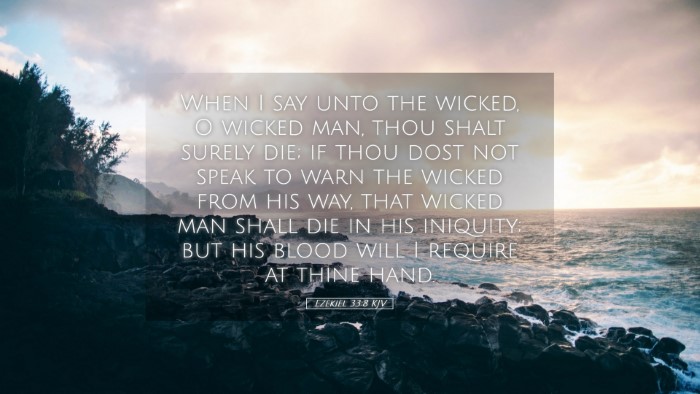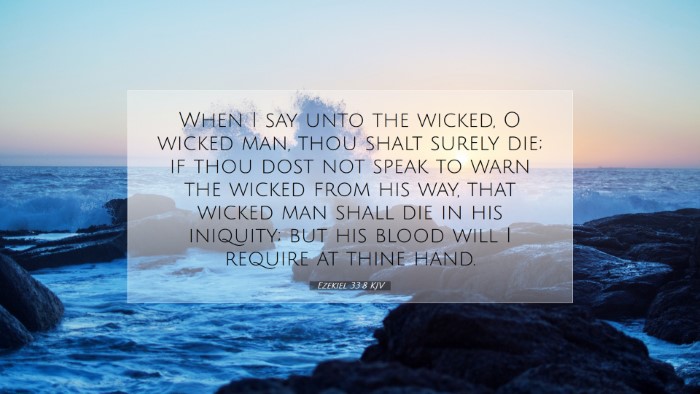Ezekiel 33:8 - Commentary
Verse Reference: Ezekiel 33:8 - "If I say unto the wicked, O wicked man, thou shalt surely die; if thou dost not speak to warn the wicked from his way, that wicked man shall die in his iniquity; but his blood will I require at thine hand."
Introduction
This verse is a critical component of the prophetic ministry of Ezekiel, a prophet who faced the challenges of delivering God's message to a rebellious Israel during and after the Babylonian exile. The passage addresses the profound responsibility of spiritual leaders to warn the unrighteous of their impending doom due to sin. A review of classic commentaries reveals various insights that both contextualize the message and apply it to contemporary ministry.
Analysis of the Text
Contextual Background
Matthew Henry provides a robust context wherein he explains the role of Ezekiel as a "watchman" for Israel. In this capacity, he presents the duty of warning the wicked encapsulated within God's command. The call to warn carries a weighty implication—it is not merely an act of sharing information but an obligation that carries grave consequences for both the one who fails to warn and the one who persists in wickedness.
Divine Judgment and Human Responsibility
Albert Barnes elaborates on the theme of divine judgment found in this verse. He highlights the dual nature of God's justice; while God is willing to bring judgment upon the wicked, He also entrusts His messengers (like Ezekiel) with the task of prolonging mercy through warning. Failure to warn results in the death of the wicked and the consequent accountability upon the watchman. Thus, this passage accentuates the interplay between divine sovereignty and human responsibility.
The Role of the Watchman
Adam Clarke provides insight into the sacrificial nature of the watchman's role. In calling out to the wicked, the prophet embodies God's heart for redemption. Clarke emphasizes that the heart of God is not swift to destroy but rather longs for the wicked to turn from their ways. This perspective adds a layer of compassion to Ezekiel's warning, transforming it from a mere proclamation of judgment to an appeal for repentance.
Theological Implications
The Concept of Accountability
This passage emphasizes accountability not just for the wicked but also for the messenger. The watchman’s warning is not only a duty but a lifeline for the sinner. Both the warning of the wicked and the consequences of inaction highlight the weight of moral responsibility in leadership. Barnes notes that spiritual leaders must courageously confront sin, insisting that neglect leads to the spiritual demise of others.
Grace and Judgment
Henry notes that the verse exemplifies the tension between grace and judgment in God's economy. It affirms that God desires repentance over punishment, extending grace through His prophetic voice. The warning serves as a chance for the wicked to embrace repentance and align with God’s covenantal faithfulness, emphasizing the proactive nature of grace as not merely revolutionary but relational.
The Urgency of the Message
The urgency of the proclamation of repentance comes through in this text. Clarke asserts that the constraints of time and circumstances demand an immediate response from the watchman. He wants to remind contemporary readers in pastoral roles that they bear the responsibility of urgency when sharing God's message. Hesitation can lead to tragic consequences, as both the spiritual leader and the wicked bear the ramifications.
Application for Modern Ministry
Implications for Pastoral Care
For pastors and spiritual leaders today, this passage serves as both a warning and a call to action. Pastoral care is enriched when leaders embrace their role as watchmen. As they counsel those entrenched in sin, they must balance love with firm admonition. The verse reminds leaders to provide clarity in their messages and to approach their congregations with a blend of compassion and earnestness.
Engagement with the Culture
The contemporary church faces the challenge of engaging a culture that often tolerates sin. Here, Barnes reminds ministers that their role goes beyond the comfort of a congregation; it includes confronting societal sins. Such engagement requires wisdom, tenderness, and a commitment to truth. Ezekiel's experience can guide ministers today in recognizing their sacred duty to speak against the tides of immorality.
The Call to Repentance
The essence of the message in Ezekiel 33:8 ultimately draws believers towards a lifestyle marked by repentance. Urging sinners towards transformation remains at the core of the Christian faith. Henry emphasizes the necessity of acting when prompted by the Spirit, presenting an alignment with God's heart for redemption.
Conclusion
The admonition in Ezekiel 33:8 resonates today with profound significance. Through Ezekiel's prophetic duty, we recognize the interplay of divine judgment, human responsibility, and the heart of God yearning for reconciliation. Modern pastors, theologians, and scholars can derive rich insights from this scripture, focusing on discernment, urgency, and the essential nature of accountability in their ministries. The echoes of this text remind leaders to act faithfully as watchmen, honoring their sacred calling to lead others out of darkness into the light of God's true counsel.


